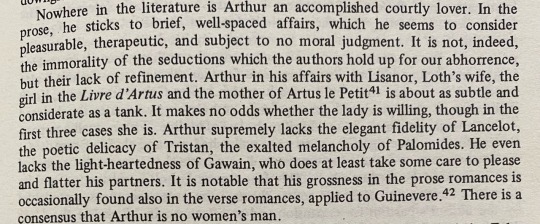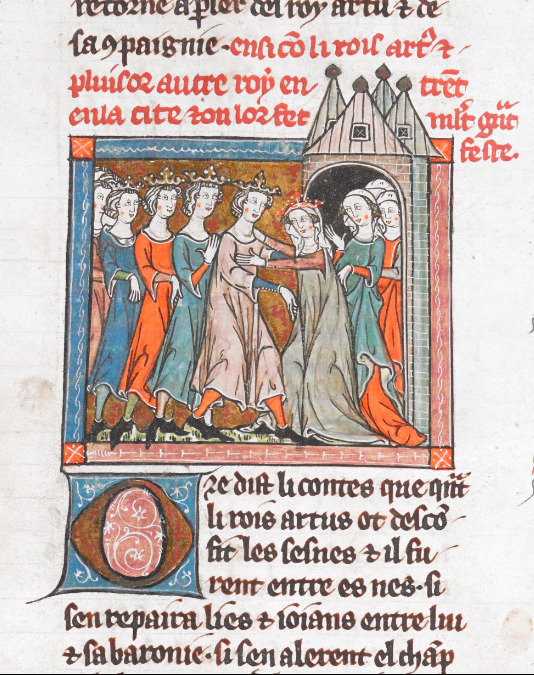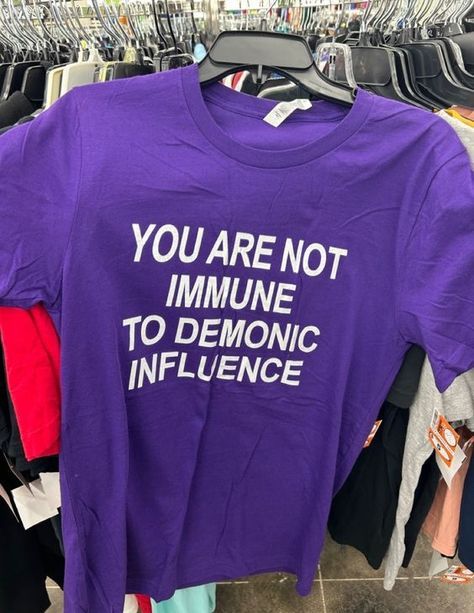Text


Wherever the king had to go, it did not care to be apart from him; it always went along with him. He could see well that it loved him.
On the king’s own bed he found the knight sleeping. The king ran to embrace him; more than a hundred times he hugs and kisses him.
some Bisclavret for you in the style of the Codex Manesse :)
234 notes
·
View notes
Text









HAND IN UNLOVEABLE HAND
E.A. Robinson Lancelot / YouTube Comment / Gustave Doré Idylls of the King / E.A. Robinson Lancelot / Rosemary Morris, The character of King Arthur in medieval literature / Tennyson Idylls of the King : Guinevere / Rosemary Morris, The character of King Arthur in medieval literature / King Arthur and Queen Guinevere in BNF 10292
149 notes
·
View notes
Text

New niche characters just dropped! Sanddef angel face (the blonde one) and Morfran son of Tegid (the guy with the horns)! the two guys who didn’t die at the end of arthur’s reign cause one was too pretty and the other wasn’t :[
source: Culhwch and Olwen

Sandde angel face: Haha don’t kill me Im too pretty to die
Morfran: :] I’m going to have ya for, i mean with, dinner
19 notes
·
View notes
Text
#rough day for Agravaine deserved but rough#can’t believe Gareth is winning though that guy does not know governance#y’all really think a Lancelot kinnie can rule a country?
26 notes
·
View notes
Text
um sorry to inform you but... "the head and neck of a serpent, the body of a leopard, the haunches of a lion and the feet of a hart" ...i believe your "questing beast" is simply a giraffe. what it is doing in the great of britain i cannot tell you but that is really just a nice giraffe you've got there
46 notes
·
View notes
Text

1K notes
·
View notes
Text
people always talk about evil clones like oooh a dark mirror oohh what if you saw what a cruel person you were/are capable of becoming. and well yes but what if you were the evil clone. what if you looked in the mirror and what you saw was so bright it blinded you. what if you had to know exactly how good you could have been.
33K notes
·
View notes
Text
Menelaus holding an egg he's just boiled for breakfast up to Helen like "omg look, it's baby Helen 🥺"
180 notes
·
View notes
Text
I got curious about how Menelaos gets chosen in various sources and made a little list*:
-In the Catalogue of Women, Tyndareos chooses/Menelaos wins because he offers the most bride gifts. [The oath is Tyndareos' idea, as far as we can tell.]
-In Stesichorus' Helen (so, the probable first version of his that treated Helen and the Trojan war, not either of his Palinodes), Tyndareos chooses after exacting the oath to keep order and the suitors from fighting each other. [No way to tell if Tyndareos came up with the oath himself or was given the idea, by Odysseus or anyone else.]
-In Euripides' Iphigenia in Aulis, Tyndareos allows Helen to choose after exacting the oath as the suitors have begun threatening each other. [Tyndareos comes up with the idea of the oath himself.]
-In the Bibliotheke, Tyndareos chooses. [Odysseus is the brain behind the oath.]
-In Hyginus' Fabulae (#78), Helen gets to choose because Tyndareos is afraid of the discord that might arise and that Agamemnon might divorce Klytaimnestra. [Odysseus is again the brain behind the oath.]
*Based on checking those sources I knew mentioned it plus Gantz's Early Greek Myth, since he's thorough in mentioning if later sources talk about something even if the focus is on earlier ones.
So what we've got is that most of the time in these sources, Tyndareos is the one to choose. In the Catalogue of Women the man chosen is also the one that, on the crassest level, is the most "worthy" by having given most for the woman. (Though it's also the source that notes if Achilles had been old enough, he would have won Helen.) Of course, if there are lost sources that touched on the suitors and Helen's marriage to Menelaos, we won't know that, or what they said about it, but this is what we've got to work with, I'm rather sure.
Tyndareos choosing is of course the most "neutral"/normative option, as that would be the regular course of things. Tyndareos being the one to choose also doesn't appear to have any correlation (as far as we can tell, anyway) whether Helen left or was kidnapped. As in, there's no correlation to whether Helen is portrayed as "guilty" or not when her father has chosen her husband.
Helen choosing comes into play for the first time in Iphigenia in Aulis, and the context of it paints a rather specific picture, I'd say.
"[...] old Tyndareus with no small cleverness had beguiled them by his shrewd device, he allowed his daughter to choose from among her suitors the one towards whom the sweet breezes of Aphrodite might carry her."
"[...] carried Helen off, in mutual desire, to his steading on Ida."
First of all, of course one could probably say much since this is all part of a speech of Agamemnon's. But, if we're allowing what's being said to stand on its own (and if there is an agenda, which undoubtedly there is, it might be Agamemnon's just as much as about how the play, meta-wise, is choosing to represent this), something becomes very clear.
Tyndareos is put forth as basically tricking the suitors, and so it puts blame on him. Helen, in being allowed to choose, is made culpable since she then still desired someone not her husband and because of that desire let herself be carried off. The chorus a little later after this both uses "carried off" as well as "fled her home to marry a foreigner". It's thus not just Agamemnon who is framing it both in terms of "kidnapping" and Helen leaving because she desires Paris.
In Hyginus we have no moral flavouring of the same kind as above, since the Fabulae are so very pared down in their language. At most it's a far more neutral casting of Helen being allowed to choose than how Iphigenia in Aulis has it. (But it's probable Hyginus got "Helen got to choose" from that play, much like Euripides and Sophocles' Alexander plays are probable sources for his own account of how Paris comes back to Troy.)
The wider context in which Helen getting to choose her own husband and how it's being portrayed is actually rather important, then, being used as it is in conjunction with Helen being portrayed as desiring Paris.
And I think it's kind of interesting how Tyndareos is apparently at first perfectly capable of coming up with the idea of the oath himself, but as soon as Odysseus in later sources worms his way into the narrative, him having come up with it is the version that dominates (especially in later awareness of the story)!
34 notes
·
View notes
Text
re: this post it's interesting that tyndareus choosing helen's husband and helen choosing for herself both come with versions of the story where odysseus was the brain behind the oath, if you consider odysseus and helen as foils and all the possible permutations of "i'm the one who devised the plot that [allowed you to choose]/[trapped you in something you did not choose], that you [left willingly]/[left unwillingly], which in turn trapped me"
48 notes
·
View notes
Text
another day in disguise on ithaca. the suitors keep asking me if they can fuck the queen. buddy, they won’t even let me fuck her
154 notes
·
View notes
Text




CARMILLA + adaptations
You are mine, you shall be mine, you and I are one forever.
@lgbtqcreators — creator bingo / adaptations
605 notes
·
View notes
Text
I think about "seinfeld is a better arthurian adaptation than bbc's merlin bc it has a woman named elaine" every single day of my life. @ whoever commented that can we kiss.
2K notes
·
View notes
Text
There's something really fascinating about how Athena treats Diomedes so differently from how treats Penelope and Odysseus (even Telemachus but that's a lil different too)
Athena has basically known Diomedes since he was born (some even say that she had a say in naming him) because of Tydeus. I don't think it's far-fetched to say that in a way, she possibly "molded" him. And Diomedes is kind of known for being the "perfect warrior king". He's respectful of the gods and most of his comrades, an incredibly skilled soldier, and has already achieved so many things despite being one of the youngest kings in the war.
I sadly think that's why Athena treats him so differently than Odysseus, Penelope, and Telemachus.
She cares for him, but it's still "distant" in a way. Or almost in an "I molded you. You will react the way I would want you to therefore I will not be surprised."
When it seems like she's known her other favored mortals for less long, she didn't get to "mold" them. They surprise and
bring something "new" for her. She sees her little tricksters' scheme and plot and watches with intrigue but watching the perfect warrior is a "Yes, perfect form. That's what I'd do."
I mean even how her favored mortals pray to her tells you a lot about the relationships they have.
For example, in the Iliad, Odysseus doesn't need to really give as much reverence to her to "earn her favor" during book 10's Night Raid.
Odysseus rejoiced, and prayed to Pallas Athene: ‘Hear me, daughter of aegis-bearing Zeus, you who are with me in all my adventures, protecting me wherever I go. Show me your love, Athene, now, more than ever, and grant we return to the ships having won renown, with some brave act that will grieve the Trojans greatly.’
And Diomedes of the loud war-cry followed him in prayer: ‘Hear me also, Atrytone, daughter of Zeus. Be with me as you were with my father Tydeus in Thebes, when he went there as ambassador for the bronze-greaved Achaeans, camped there by the Asopus. A friendly offer was what he made them, but on his way back he was forced to take deadly reprisal for their ambush, and you fair goddess, readily stood by him. Stand by me now, and watch over me, and in return I will offer a broad-browed yearling heifer, unused to the yoke. I will tip her horns with gold and sacrifice her to you.’
(Book 10, A.S. Kline)
Diomedes brings up his dad and offers a young heifer (granted that could just be how Diomedes is with every immortal) while Odysseus doesn't and is basically like "Yo, help me out like you always do!". Odysseus is much more casual and personal with Athena. And with Penelope, Athena takes the form of one of her sisters to comfort her!
While Athena also most likely has known Telemachus since he was a baby, she's still closer to him than Diomedes.
Imagine that. You're basically molded by a goddess since birth, listen to her and other immortals dutifully, basically become her perfect warrior, and yet you can't seem to reach that familiarity with her. The same warmth she has for her other favored mortals.
83 notes
·
View notes
Text




Ralph Fiennes
The Return
#yayayay#get ready for me to be horny on main for Penelope when this comes out#more than I already am for her I suppose
374 notes
·
View notes
Text
Need to reread Christabel. Poems been on my mind all day
1 note
·
View note
Text
Fascinated by stories of the - I guess you'd call it the "stolen identity" genre, like, of the Anastasia Romanov variety. But - from both sides.
Your husband has been at war for thirty years. You married when you were teenagers. The man who returns bearing his name looks... plausible, you don't remember his eyes being quite so blue, but it's been thirty years and it's not like you could ever afford to have a portrait painted. He knows your name and the names of your children and your parents, but there are curious gaps in what he remembers. But war does things to the mind. And if he's kinder than you remember? Kind enough that, maybe, you let yourself believe...
No one has ever looked twice at you, since you're just the maid, until the day a revolutionary bomb goes off, blowing a crater in the summer palace. The famously reclusive duchess and the rest of her household lie dead in the rubble. You know that you and she were the same dress size. You know where her jewels are kept. Most importantly, you know the location of the secret tunnel that leads down to the docks, and to a life overseas that would be torturously hard going for a poor maid, especially one suspected as a thief, but a lot more comfortable for a royal in exile...
The old king's most faithful retainer swears this is the heir to the throne, raised in secret and trained to one day step into his father's shoes. As the usurper as dragged off the throne, she screams that the old king's children are all dead, she made sure of it; no one pays her any heed. (Maybe they should have...)
The man in the tavern is buying drinks for the whole bar before he sets sail tomorrow for the far side of the world. He's got it all figured out - a ship of his own, retirement to a tropical paradise when he gets sick of the pirating life. His lip curls as he talks about the stultifying boredom of the aristocratic world he's already left behind. You find out that his parents recently died, and the estate is in the care of his younger sister, who was only six when her brother first left home two decades since. Between the lines, they sound like a good family; they sound like they love him, the way your family never did. Your heart aches. He shows you portraits, letters, before shoving them carelessly back in his coat pocket. They would be so easy to lift...
It's a surprisingly common concept and I just love it. It's The Return of Martin Guerre; it's multiple 90s romcoms; Agatha Christie pulls it half a dozen times. Sooner or later, it crops up in fanfic for just about any fandom with a royal or aristocratic main character.
And I can see why, because there's so much richness to it. From the outside, it can be anything from a horror story to an unlikely love story; from the perspective of the person pulling off the con, a heist movie or a tragedy or a heartwarming tale of found family. And then there are the longer-term implications: What happens if you wear a mask so long that it becomes who you are? What happens if you come to love the "replacement" to the point where you don't want to find out the truth? What is it like to uncover such a deception a century down the line, to find out that your great-grandfather... wasn't?
Just. Identity stories, man. <3
10K notes
·
View notes